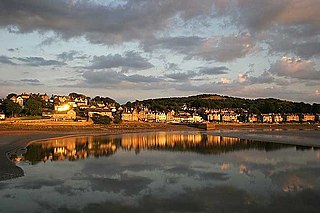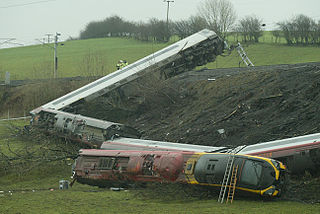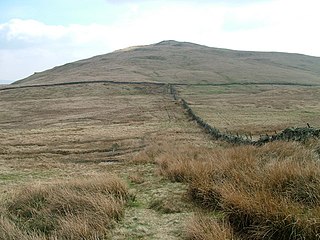
Kendal, once Kirkby in Kendal or Kirkby Kendal, is a market town and civil parish in the unitary authority of Westmorland and Furness, England. It lies within the River Kent's dale, from which its name is derived, just outside the boundary of the Lake District National Park.

Kirkby Lonsdale is a town and civil parish in the Westmorland and Furness district of Cumbria, England, on the River Lune. Historically in Westmorland, it lies 13 miles (21 km) south-east of Kendal on the A65. The parish recorded a population of 1,771 in the 2001 census, increasing to 1,843 at the 2011 Census.

Milnthorpe is a village, civil parish, and former market town in Westmorland and Furness, Cumbria, England. It is 7 miles (11 km) south of Kendal. Historically in the county of Westmorland and on the A6, the village contains several old hostelries and hosts a market every Friday. The parish, which includes the village of Ackenthwaite, had a population of 2,199 according to the 2011 Census.

Arnside is a village and civil parish in Westmorland and Furness, Cumbria, England. It is historically part of Westmorland, near the border with Lancashire, England. The Lake District National Park is located a few miles north. Travelling by road, Arnside is 10 miles (16 km) to the south of Kendal, 25.3 miles (40.7 km) to the east of Ulverston, 35.2 miles (56.6 km) to the east of Barrow-in-Furness, 13 miles (21 km) to the north of Lancaster and 14.3 miles (23.0 km) to the east of Grange-over-Sands. In the 2001 census the parish had a population of 2,301, increasing at the 2011 census to 2,334.

Kirkby Stephen is a market town and civil parish in Cumbria, England. It lies on the A685 and is surrounded by sparsely populated hill country, about 25 miles (40 km) from the nearest larger towns, Kendal and Penrith. The River Eden rises 6 miles (10 km) away in the peat bogs below Hugh Seat and passes the eastern edge of the town. At the 2001 census the parish had a population of 1,832. In 2011, it had a population of 1,522.

Oxenholme Lake District railway station in Oxenholme, near Kendal, Cumbria, England, is on the West Coast Main Line and at the start of the Windermere branch line to Windermere. The station, which serves as a main line connection point for Kendal and Windermere, is managed by Avanti West Coast and owned by Network Rail.

Oxenholme is a village in England just south of the town of Kendal, with which it has begun to merge. It is best known for Oxenholme Lake District railway station on the West Coast Main Line. By strict English definition, Oxenholme is a hamlet rather than a village, as it does not have a church.

Shap is a village and civil parish located among fells and isolated dales in Westmorland and Furness, Cumbria, England. The village is in the historic county of Westmorland. The parish had a population of 1,221 in 2001, increasing slightly to 1,264 at the 2011 Census.

Tebay is a village and civil parish in Cumbria, England, within the historic borders of Westmorland. It lies in the upper Lune Valley, at the head of the Lune Gorge. The parish had a population of 728 in the 2001 census, increasing to 776 at the Census 2011.

Grayrigg is a small village and civil parish in the Westmorland and Furness district of Cumbria, England. In the 2001 census the parish had a population of 223, increasing at the 2011 census to 242. It lies on undulated and partly mountainous land, 4.9 miles (8 km) north east of Kendal, on the north side of the West Coast Main Line, and west side of the M6 motorway.

The Barony of Kendal is a subdivision of the English historic county of Westmorland. It evolved from one of two ancient baronies that make up the county, the other being the Barony of Westmorland. In 1974, the entire county became part of the modern county of Cumbria and ceased to have an administrative function. At the same time, Kendal borough along with some other rural and urban districts in Westmorland was merged with the neighbouring parts of Lancashire, Furness and Cartmel, and also the Sedbergh Rural District of the West Riding of Yorkshire into the new South Lakeland district of the new county.

Hincaster is a small hamlet and civil parish in the Unitary Authority of Westmorland and Furness Cumbria, England, located between Kendal and Milnthorpe. In the 2001 census the parish had a population of 195, increasing at the 2011 census to 209.

Holme is a village and civil parish in the Westmorland and Furness district of Cumbria, England, about 2 miles (3.2 km) north of Burton-in-Kendal and 3 miles (4.8 km) south east of Milnthorpe. The parish had a population of 1,167 at the 2001 census, increasing to 1,486 at the 2011 Census.

Casterton is a small village and civil parish close to Kirkby Lonsdale on the River Lune in the south east corner of Cumbria, England. In the 2001 census the parish had a population of 500, decreasing at the 2011 census to 425.

The Grayrigg derailment was a fatal railway accident that occurred at approximately 20:15 GMT on 23 February 2007, just to the south of Grayrigg, Cumbria, in the North West England region of the United Kingdom. The accident investigation concluded that the derailment was caused by a faulty set of points on the Down Main running line, controlled from Lambrigg ground frame. The scheduled inspection on 18 February 2007 had not taken place and the faults had gone undetected.

Lambrigg Fell is a hill, the highest point of the area of high ground between Kendal and the M6, in south-eastern Cumbria, England.

Crooklands is a hamlet in Westmorland and Furness, Cumbria, England, 4.5 miles (7.2 km) south of Kendal on the A65 road and the Lancaster Canal. Historically part of Westmorland, it is in the parish of Preston Richard but adjacent to Preston Patrick to the south east, the boundary roughly following Peasey Beck. The adjacent showfield of the Westmorland County Agricultural Society is the venue of the annual Westmorland County Show, Country Fest and various other events.

Grayrigg railway station in Lambrigg parish, was situated on the course of the original Lancaster and Carlisle Railway (L&CR) between Lancaster and Penrith. It served the village and rural district of Grayrigg, Cumbria, England. The new station opened in November 1849, and closed on 1 February 1954 replacing the L&CR station that was located two miles (3.2 km) west of the station and closed in 1849.

Whinfell is a civil parish in Westmorland and Furness, Cumbria, England. It does not have a parish council but a parish meeting. The parish lies north east of Kendal, between the A6 and the A685. The neighbouring parishes are Grayrigg to the east, Docker to the south, Skelsmergh to the south west, Selside and Fawcett Forest to the west, and Tebay to the north.
Grayrigg is a civil parish in the South Lakeland District of Cumbria, England. It contains eleven listed buildings that are recorded in the National Heritage List for England. Of these, one is listed at Grade II*, the middle of the three grades, and the others are at Grade II, the lowest grade. The parish is almost entirely rural, the only significant settlement being the village of Grayrigg. The listed buildings include houses, farmhouses, farm buildings, bridges, milestones, a church, and a disused railway viaduct.























